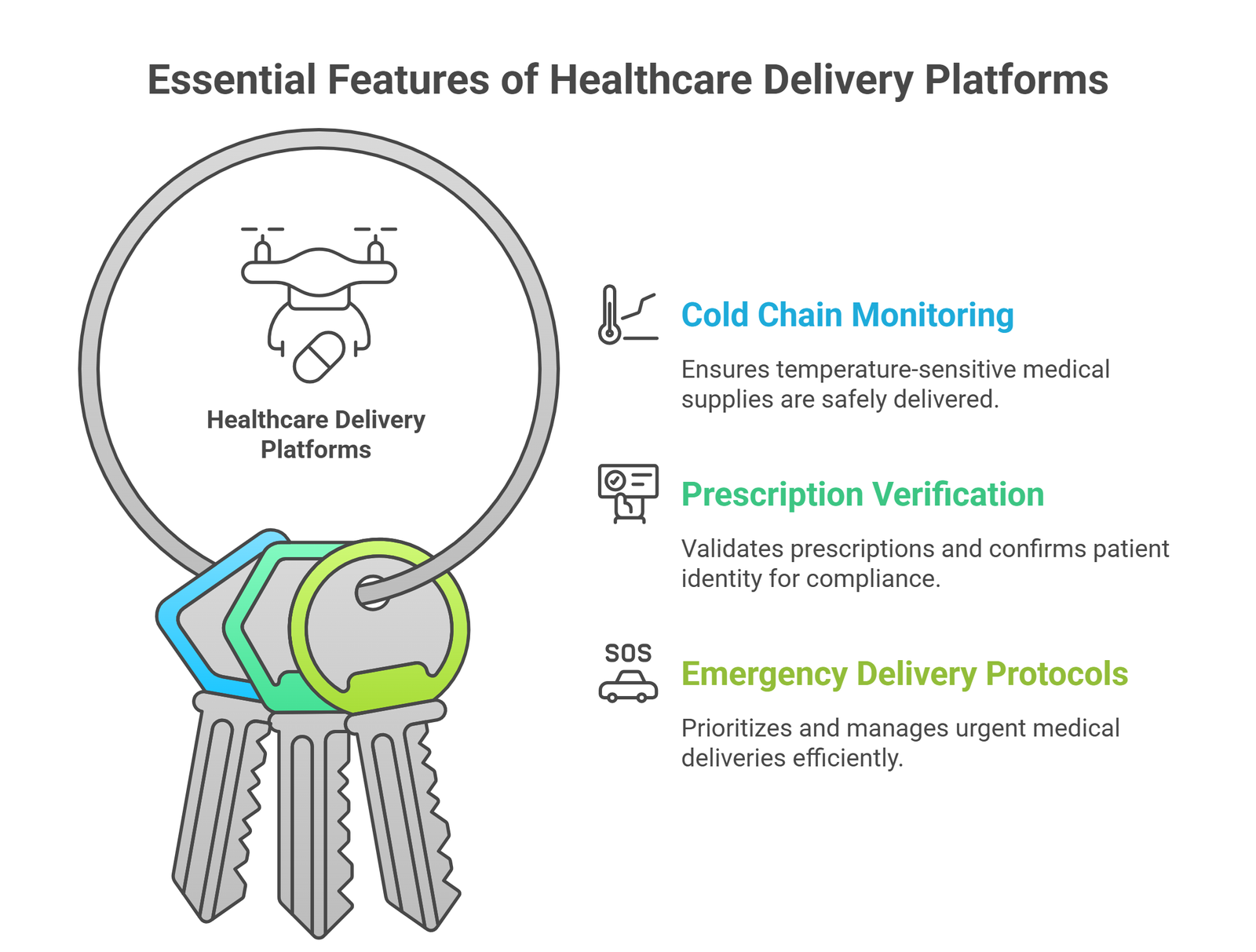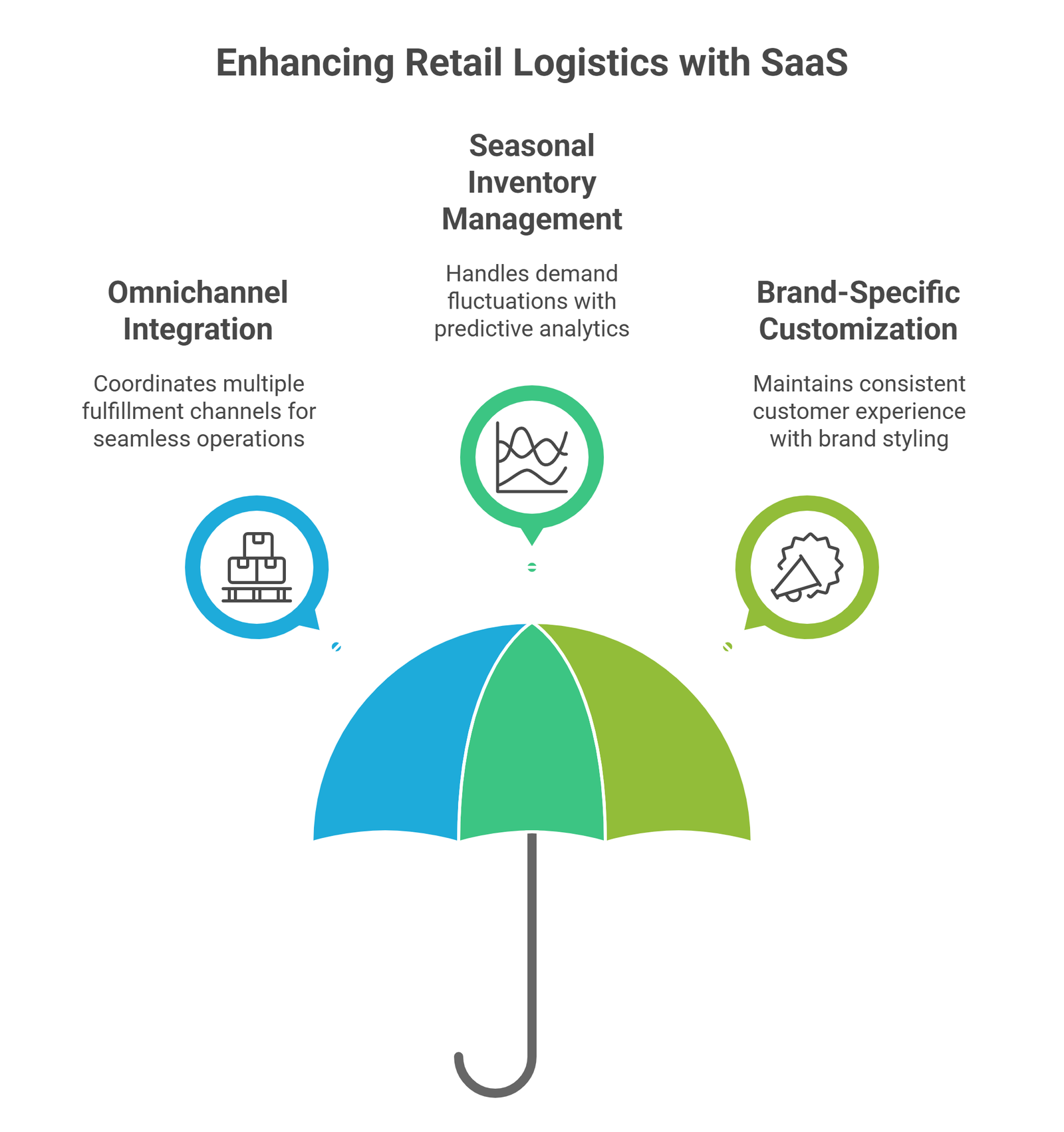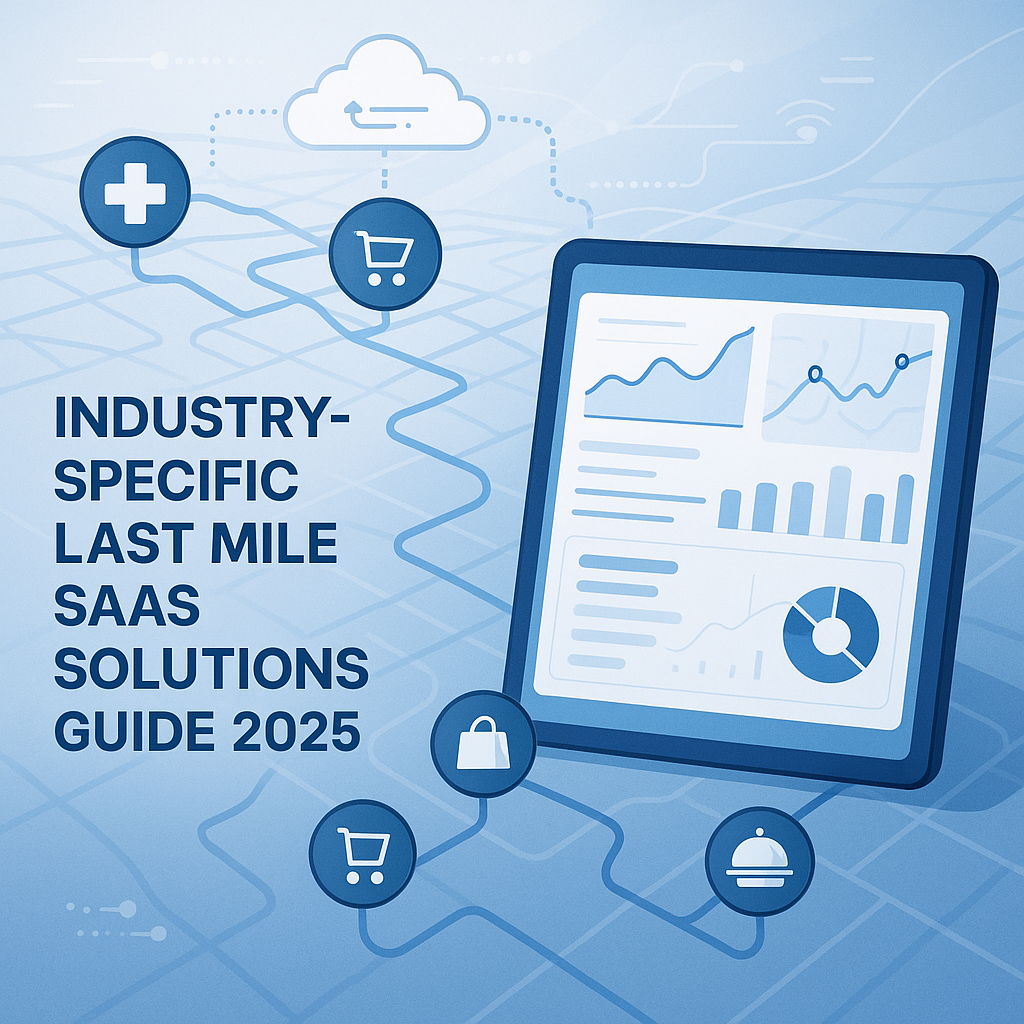Think about the last time you ordered medicine online versus ordering a pizza. The delivery requirements are completely different, right? Your prescription needs temperature control, regulatory compliance, and secure handling, while your pizza needs speed, heat retention, and real-time tracking. This fundamental difference explains why industry-specific last mile SaaS solutions have become essential for modern businesses.
What are industry-specific last mile SaaS solutions? Simply put, they’re specialized delivery platforms designed to meet the unique requirements of specific industries. Unlike generic logistics software that tries to be everything to everyone, vertical-specific delivery platforms focus on solving the particular challenges that each sector faces.
The one-size-fits-all approach to logistics is becoming obsolete. Today’s businesses need customized delivery platforms that understand their industry’s nuances, regulatory requirements, and customer expectations. Whether you’re managing pharmaceutical distributions or coordinating fashion retail deliveries, the right industry last mile software can make the difference between operational success and costly failures.
Understanding the Need for Vertical Logistics Software
The logistics landscape has evolved dramatically over the past decade. How do different industries use last mile delivery platforms? The answer reveals why specialization matters so much in today’s market.
Consider the complexity of managing deliveries across different sectors. An e-commerce retailer might prioritize speed and return management, while a pharmaceutical company focuses on temperature control and regulatory compliance. A grocery delivery service needs to handle perishable items with precision timing, whereas an electronics distributor must ensure fragile items arrive safely.
The Cost of Generic Solutions
Many businesses start with generic logistics platforms, thinking they’ll save money and complexity. However, this approach often leads to:
- Compliance gaps that create regulatory risks
- Operational inefficiencies from poorly fitted workflows
- Customer dissatisfaction due to inappropriate service levels
- Higher long-term costs from customization and workarounds
Sector-specific logistics SaaS solutions eliminate these issues by providing pre-built functionality that aligns with industry requirements from day one.
Benefits of Industry-Tailored Solutions
- Specialized last mile platforms offer several advantages over generic alternatives:
- Faster Implementation: Pre-configured workflows and industry-standard integrations reduce deployment time by 40-60%.
- Better Compliance: Built-in regulatory features ensure adherence to industry standards without custom development.
- Enhanced Performance: Industry-tailored delivery workflows optimize operations for sector-specific requirements.
- Lower Total Cost: Despite potentially higher upfront costs, specialized solutions typically deliver better ROI through improved efficiency and reduced customization needs.
E-commerce Last Mile SaaS: Powering Online Retail Success
E-commerce last mile SaaS platforms face unique challenges that distinguish them from other delivery solutions. The rapid growth of online shopping has created demanding customer expectations around speed, transparency, and flexibility.
Key Features for E-commerce Success
Return and Exchange Management: Modern e-commerce last mile delivery platform with returns management must handle reverse logistics seamlessly. This includes:
- Automated return authorization processes
- Optimized pickup routing for returned items
- Real-time inventory updates for returned products
- Customer self-service portals for return requests
Peak Season Scalability: E-commerce businesses experience dramatic volume fluctuations during sales events and holidays. Peak season scalability features include:
- Auto-scaling infrastructure to handle 300-500% volume increases
- Dynamic resource allocation based on demand predictions
- Surge pricing models for premium delivery options
- Overflow capacity management through partner networks
Multi-Channel Fulfillment: Today’s retailers operate across multiple channels simultaneously. Multi-channel fulfillment capabilities ensure consistent service across:
- Online marketplaces like Amazon and Flipkart
- Direct-to-consumer websites
- Social commerce platforms
- Mobile applications
Cash on Delivery Optimization
In markets like India, cash on delivery optimization remains crucial for e-commerce success. Advanced platforms provide:
- COD risk assessment algorithms
- Dynamic COD limits based on customer history
- Automated collection reconciliation
- Fraud detection mechanisms
Healthcare Delivery Platforms: Ensuring Safety and Compliance
Healthcare delivery platforms operate under stringent regulatory requirements while managing time-sensitive, often life-critical deliveries. What features do healthcare delivery platforms need? The answer involves a complex mix of compliance, security, and specialized handling capabilities.
Cold Chain Monitoring
Cold chain monitoring is essential for pharmaceutical and medical supply deliveries:
- Real-time temperature tracking throughout the delivery journey
- Automated alerts for temperature deviations
- Compliance documentation for regulatory audits
- Route optimization considering temperature-controlled vehicle availability

Prescription Verification
Prescription verification workflows ensure regulatory compliance:
- Digital prescription validation against authorized databases
- Patient identity confirmation at delivery
- Controlled substance tracking with chain of custody documentation
- Pharmacist approval workflows for high-risk medications
Emergency Delivery Protocols
Emergency delivery protocols handle urgent medical situations:
- Priority routing algorithms for critical deliveries
- Real-time resource reallocation for emergencies
- Direct communication channels with healthcare providers
- Backup delivery options to ensure continuity
Food Delivery SaaS Platforms: Managing Perishables and Time Sensitivity
Food delivery SaaS platforms face unique challenges around freshness, timing, and customer expectations. How does food delivery SaaS differ from retail logistics? The primary differences lie in time sensitivity, temperature control, and quality preservation.
Temperature-Controlled Delivery
Temperature-controlled delivery systems ensure food quality:
- Multi-zone temperature monitoring for different food types
- Insulated container tracking with sensor integration
- Optimal route planning to minimize delivery time
- Quality assurance checkpoints throughout the journey
Real-Time Order Modifications
Food delivery platform with real-time order tracking must accommodate last-minute changes:
- Dynamic menu updates based on ingredient availability
- Order modification windows with automated cutoff times
- Kitchen integration for real-time preparation status
- Customer communication about delays or substitutions
Perishable Item Handling
Perishable item handling requires specialized workflows:
- Expiration date tracking and rotation management
- Quality control checkpoints at multiple stages
- Automated waste management for expired items
- Customer preference management for substitutions
Pharmaceutical Logistics Software: Compliance and Security First
Pharmaceutical logistics software operates under some of the strictest regulatory requirements in any industry. What compliance features are needed for pharmaceutical delivery? The answer encompasses multiple layers of regulatory adherence, security protocols, and quality assurance.
Regulatory Compliance Tracking
Regulatory compliance tracking ensures adherence to pharmaceutical regulations:
- FDA/CDSCO compliance documentation and reporting
- Good Distribution Practice (GDP) adherence tracking
- Serialization and track-and-trace capabilities
- Audit trail maintenance for regulatory inspections
Controlled Substance Management
Controlled substance management requires specialized security measures:
- DEA compliance for controlled substance deliveries
- Secure chain of custody documentation
- Background-checked driver assignments
- Real-time inventory reconciliation
Temperature Logging Systems
Temperature logging systems maintain product integrity:
- Continuous temperature monitoring with data logging
- Deviation alerts with automated escalation
- Calibrated sensor networks for accuracy
- Regulatory reporting with temperature history
Retail Logistics SaaS Solutions: Omnichannel Excellence
Retail logistics SaaS solutions must coordinate complex omnichannel operations while maintaining brand consistency across all touchpoints. Modern retail requires seamless integration between online and offline channels.
Omnichannel Integration
Omnichannel integration coordinates multiple fulfillment channels:
- Unified inventory visibility across all locations
- Store pickup coordination with online orders
- Ship-from-store capabilities for optimal fulfillment
- Cross-channel returns processing

Seasonal Inventory Management
Seasonal inventory management handles demand fluctuations:
- Predictive analytics for seasonal demand planning
- Dynamic inventory allocation across channels
- Clearance optimization for end-of-season items
- Supplier coordination for seasonal merchandise
Brand-Specific Customization
Brand-specific customization maintains consistent customer experience:
- White-label delivery interfaces with brand styling
- Custom packaging requirements tracking
- Brand-specific service levels and delivery options
- Marketing integration with loyalty programs
FMCG and Manufacturing Distribution Platforms
FMCG delivery management systems and manufacturing distribution platforms focus on high-volume, cost-efficient operations with complex supply chain coordination.
Route Optimization for Volume
FMCG distribution system with route optimization handles large-scale deliveries:
- Multi-stop optimization for bulk deliveries
- Load planning algorithms for vehicle capacity maximization
- Territory management for sales force coordination
- Distributor network integration
B2B Marketplace Integration
B2B marketplace logistics with multi-vendor support coordinates complex supplier networks:
- Multi-vendor coordination with unified tracking
- Supplier performance metrics and scorecards
- Automated procurement workflows
- Payment reconciliation across multiple vendors
People read about: Role of Zoom and WhatsApp in School Management
Specialized Solutions for Niche Industries
Electronics and Fragile Items
Electronics delivery platform with fragile item handling requires specialized care:
- Shock and vibration monitoring during transport
- Specialized packaging requirements tracking
- Insurance integration for high-value items
- Signature confirmation with photo documentation
Beauty and Fashion Industries
Beauty industry delivery solutions and fashion logistics platform with seasonal demand planning address unique requirements:
- Product authenticity verification to prevent counterfeits
- Seasonal trend integration with inventory planning
- Influencer collaboration tracking and fulfillment
- Sample distribution management
Automotive Parts Distribution
Automotive parts logistics platforms handle complex part identification and urgent delivery needs:
- VIN-based part matching for accuracy
- Emergency parts delivery for breakdown situations
- Warranty tracking and returns processing
- Dealer network integration
Choosing the Right Industry-Specific Platform
How to choose last mile SaaS for specific industries? The selection process requires careful evaluation of industry requirements, compliance needs, and growth projections.
Key Selection Criteria
- Industry Expertise: Look for platforms with deep understanding of your sector’s specific challenges and regulatory requirements.
- Compliance Features: Ensure the platform includes built-in compliance tools for your industry’s regulations.
- Integration Capabilities: Vertical integration capabilities should align with your existing technology stack.
- Scalability: The platform should handle your current volume while accommodating future growth.
- Support Quality: Industry-specific support teams understand your unique challenges and can provide targeted assistance.
Implementation Considerations
- Industry API Integration Requirements: Different industries have unique integration needs. Healthcare platforms must connect with EMR systems, while retail platforms need POS integration.
- Vertical-Specific Data Models: The platform’s data structure should align with industry standards and reporting requirements.
- Custom Workflow Automation: Look for platforms that offer sector-specific workflow customization without extensive development.
Future Trends in Industry-Specific Last Mile SaaS
The logistics technology landscape continues evolving, with several trends shaping the future of vertical market solutions:
AI and Machine Learning Integration
Advanced platforms are incorporating AI for:
- Predictive demand forecasting by industry
- Dynamic pricing optimization based on sector patterns
- Intelligent route planning considering industry-specific constraints
- Automated exception handling for common industry issues
IoT and Sensor Integration
Internet of Things technology enables:
- Real-time condition monitoring for sensitive products
- Predictive maintenance for delivery vehicles
- Environmental tracking throughout the supply chain
- Automated quality control checkpoints
Blockchain for Transparency
Blockchain technology provides:
- Immutable audit trails for regulatory compliance
- Supply chain transparency for consumer confidence
- Smart contracts for automated compliance verification
- Counterfeit prevention through product authentication
Conclusion: Selecting Your Industry-Specific Solution
The era of generic logistics platforms is ending. Today’s competitive landscape demands industry-specific last mile SaaS solutions that understand your sector’s unique requirements, regulatory environment, and customer expectations.
Which industries benefit most from specialized logistics SaaS? The answer is virtually all of them. From healthcare’s stringent compliance requirements to e-commerce’s peak season challenges, every industry has specific needs that generic platforms struggle to address effectively.
The key to success lies in choosing a vertical-specific delivery platform that aligns with your industry’s requirements while providing the scalability and flexibility needed for future growth. Whether you need healthcare logistics SaaS with temperature monitoring or retail omnichannel delivery platform with inventory sync, the right industry-specific solution will transform your logistics operations from a cost center into a competitive advantage.
Ready to explore industry-specific last mile SaaS solutions for your business? The investment in specialized logistics technology pays dividends through improved efficiency, better compliance, and enhanced customer satisfaction. Don’t let generic solutions hold back your industry-specific success.
Frequently Asked Questions
1. What makes industry-specific last mile SaaS different from generic logistics platforms?
Industry-specific last mile SaaS solutions are built with deep understanding of particular sectors’ unique requirements, regulatory compliance needs, and operational workflows. Unlike generic platforms that require extensive customization, vertical-specific delivery platforms come pre-configured with industry-standard features like cold chain monitoring for healthcare or return and exchange management for e-commerce, reducing implementation time and ensuring compliance from day one.
2. How do I determine which specialized features my industry needs in a last mile platform?
Start by identifying your industry’s core challenges: regulatory requirements, product handling needs, customer expectations, and operational constraints. For example, pharmaceutical distribution software needs controlled substance management and temperature logging systems, while food delivery SaaS platforms require perishable item handling and real-time order modifications. Consult with industry associations and review compliance guidelines to ensure comprehensive feature coverage.
3. What are the cost implications of choosing industry-specific versus generic last mile solutions?
While sector-specific logistics SaaS may have higher upfront costs, they typically deliver better ROI through reduced customization expenses, faster implementation, and improved operational efficiency. Industry delivery solutions eliminate the need for extensive modifications, reduce compliance risks, and provide industry-tailored delivery workflows that optimize performance. Most businesses see 20-40% cost savings over three years compared to heavily customized generic platforms.
4. How important are compliance features in industry-specific delivery platforms?
Compliance features are critical, especially for regulated industries like healthcare, pharmaceuticals, and food services. Industry compliance tracking capabilities ensure adherence to sector-specific regulations like FDA requirements for pharmaceuticals or food safety standards for grocery delivery. Regulatory compliance tracking features include automated documentation, audit trails, and reporting tools that reduce compliance risks and simplify regulatory inspections.
5. Can industry-specific platforms integrate with existing business systems and scale with growth?
Modern vertical logistics software offers robust industry API integration requirements and vertical integration capabilities designed for seamless connection with sector-specific systems like EMRs for healthcare or POS systems for retail. Specialized last mile platforms are built with vertical scalability considerations that accommodate industry growth patterns, whether handling seasonal spikes in retail or expanding geographic coverage in healthcare delivery networks.
